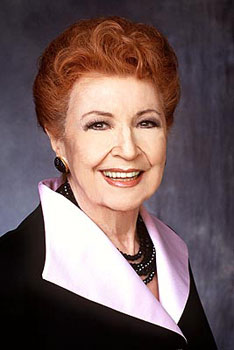Eileen Herlie facts for kids
Quick facts for kids
Eileen Herlie
|
|
|---|---|

2000 photograph
|
|
| Born |
Eileen Isobel Herlihy
March 8, 1918 Glasgow, Lanarkshire, Scotland
|
| Died | October 8, 2008 (aged 90) New York City, US
|
| Occupation | Actress |
| Years active | 1938–2008 |
| Spouse(s) | Philip Barrett (m 1942 div?) Witold Kuncewicz (m 1951 div?) |
Eileen Herlie (born March 8, 1918 – died October 8, 2008) was a talented Scottish-American actress. She was famous for her work on stage, in movies, and on television. Many people remember her for playing Gertrude, Hamlet's mother, in several productions. She was also well-known for her long-running role as Myrtle Fargate on the TV show All My Children.
Contents
About Eileen Herlie's Life
Eileen Herlie was born Eileen Isobel Herlihy in Glasgow, Scotland. She was one of five children. Her father was Irish Catholic, and her mother was Scottish Protestant. Eileen went to Shawlands Academy in Glasgow.
She trained to be a theatre actress. She had many successful roles in London's West End. She was married twice, to Philip Barrett and Witold Kuncewicz. Both marriages ended in divorce. Eileen did not have any children. In 1955, she moved to the United States. She lived and worked there for the rest of her life.
Eileen Herlie's Acting Career
Eileen decided to become an actress in 1938. She joined a touring group called the Scottish National Players. Later, she toured with the Rutherglen Repertory Company. In 1942, she moved to England to become a professional actress.
Early Roles in Theatre and Film
Her first role in London theatre was in 1942. She played the second Mrs. de Winter in Rebecca. This play was based on a novel by Daphne du Maurier.
In 1945, Eileen played Gertrude in Hamlet for the first time. This was at the Royal Shakespeare Theatre in Stratford-upon-Avon. She was 27 years old, and the actor playing her son, Hamlet, was 31.
Her first film role was in 1946. She played Katherine in Hungry Hill. This film was also based on a novel by Daphne du Maurier.
Working with Sir Alexander Korda
Sir Alexander Korda, a famous film producer, signed her to his company. She made two films for him. These were The Angel with the Trumpet (1949) and The Story of Gilbert and Sullivan (1952). She also made three other British films.
In 1951, Eileen appeared on television for the first time. She played Regina in a BBC TV show. It was based on the play The Little Foxes.
Playing Gertrude in Hamlet
Eileen's big break in films came in 1947. Laurence Olivier cast her in his movie version of Hamlet. She played Hamlet's mother, Gertrude, for the second time. She was 29, and Olivier, who played Hamlet, was 40. This meant she was 11 years younger than her "son" in the movie.
She played Gertrude again in 1964. This was for a Broadway play starring Richard Burton. She also appeared in the film version of that play. By then, she was 46 and Burton was 38. So, she was eight years older than her stage son.
Other Film and Broadway Roles
In the 1960s, Eileen appeared in other American films. These included Freud: The Secret Passion (1962) and The Sea Gull (1968). The Sea Gull was the first major English film version of Anton Chekhov's famous play.
In 1955, Eileen made her Broadway debut. She played Irene Molloy in The Matchmaker. This play later became the musical Hello, Dolly!. In 1960, she was nominated for a Tony Award. This was for 'Best Actress in a Musical' in Take Me Along. She sang the song "Once Upon a Time" in the musical All American (1962).
She also appeared in other Broadway plays. These included Photo Finish (1963) and Halfway Up the Tree (1967). Both were written by Peter Ustinov. In 1973, she played Queen Mary in Crown Matrimonial. She had played Queen Mary before in a 1972 TV film.
Myrtle Fargate on All My Children
On May 18, 1976, Eileen started a new chapter in her career. She joined the TV soap opera All My Children. She played the character Myrtle Fargate for almost the rest of her life. She became very popular in this role.
In the 1980s, Eileen was nominated for three Daytime Emmy Awards. These were in 1984, 1985, and 1986. She became good friends with her co-star Louis Edmonds.
Eileen was one of the few actresses to play the same character on three different soap operas. In 1993, she played Myrtle on Loving. In 2000, she also appeared as Myrtle on One Life to Live. Her last appearance on All My Children was in June 2008. This was just a few months before she passed away.
Death of Eileen Herlie
Eileen Herlie died on October 8, 2008. She was 90 years old. She passed away due to problems from pneumonia.
On December 19, 2008, All My Children honored Eileen. The episode was dedicated to her and her character, Myrtle. Characters close to Myrtle celebrated her life. The show's creator, Agnes Nixon, blew a kiss to Myrtle's portrait.
Awards and Nominations
Eileen Herlie received several nominations for her acting work:
- Daytime Emmy Award nominations
- (1986) Outstanding Supporting Actress in a Drama Series for All My Children
- (1985) Outstanding Actress in a Supporting Role in a Daytime Drama Series for All My Children
- (1984) Outstanding Actress in a Supporting Role in a Daytime Drama Series for All My Children
- Tony Award nominations
- (1960) Best Actress in a Musical for Take Me Along

